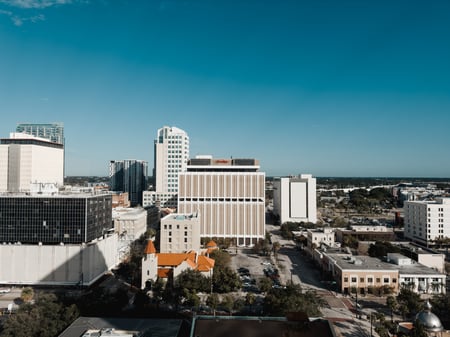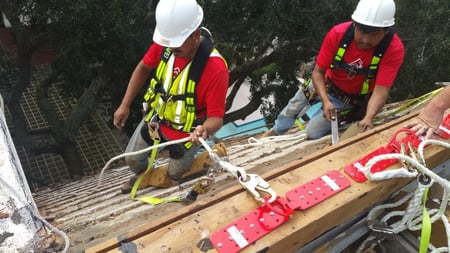Commercial Roofing in Florida: What Every Business Owner Should Know
August , 2024 | 10 min. read

When it comes to commercial roofing in Florida, the stakes are high. The Sunshine State isn't just about beautiful beaches and year-round sunshine; it’s also a place where the weather can be notoriously unpredictable.
From blistering sun to hurricane-force winds, our team here at RoofCrafters knows that the demands on a commercial roof in Florida are unique and rigorous. We’ve been in the biz for over 30 years now, and the heat and humidity are no joke!
So, if you’re wondering, “How exactly do I take care of my commercial roof in Florida?”, you’re in the right place! Stick around to learn the basics of commercial roofing in our region, the most common materials on the market, some tips and tricks about energy efficiency, and more! Let’s get started.
Understanding the Basics of Commercial Roofing in Florida

First off, let's break down what makes commercial roofing in Florida different from other states. Florida's unique climate poses specific challenges, particularly in terms of durability and energy efficiency. Whether you’re a business owner or a property manager, understanding these challenges can help you make informed decisions that protect your investment.
The Climate Factor
Florida is known for its warm, humid climate, which brings with it a unique set of issues for commercial roofs. The combination of intense UV radiation, high humidity, and heavy rainfall means that roofs here need to be exceptionally resilient.
Wind Resistance
Florida's hurricane season, which lasts from June through November, is notorious for high winds that can cause significant damage to commercial properties. Ensuring that your commercial roof is built to withstand these forces is crucial.
Building Codes and Regulations
Florida has some of the strictest building codes in the country, especially when it comes to roofing. These codes are in place to protect buildings from the extreme weather conditions that the state often faces. Staying compliant with these regulations is not just about avoiding fines—it's about ensuring the safety and longevity of your property.
Types of Commercial Roofing Systems in Florida

When choosing a roofing system for your commercial building in Florida, it's essential to consider the specific needs of your property, as well as the demands of the local climate. Here’s a breakdown of some of the most popular commercial roofing options in the state:
TPO Roofing (Thermoplastic Olefin)
TPO is one of the most popular roofing materials for commercial buildings in Florida. It's a single-ply membrane that is highly resistant to UV rays, making it ideal for the state’s sunny climate. Additionally, TPO roofing is known for its energy efficiency, which can help lower cooling costs—a significant consideration in Florida's hot weather.
EPDM Roofing (Ethylene Propylene Diene Monomer)
EPDM roofing is another single-ply membrane option that’s known for its durability and weather resistance. It’s particularly effective at withstanding the wide temperature fluctuations that can occur in Florida, from hot summer days to cooler winter nights. However, it's not as energy-efficient as TPO, so that's something to keep in mind.
Metal Roofing
Metal roofing is a durable and long-lasting option that is particularly suited to Florida’s challenging climate. It can withstand high winds, resist fire, and reflect sunlight, which helps in keeping the building cool. While metal roofing can be more expensive upfront, its longevity and durability often make it a cost-effective choice in the long run.
Modified Bitumen Roofing
Modified bitumen is an asphalt-based roofing system that’s reinforced with either polyester or fiberglass. It’s an excellent choice for flat or low-slope roofs, which are common in commercial buildings. This type of roofing is also highly resistant to weather and can be installed with multiple layers for added protection.
Built-Up Roofing (BUR)
Built-up roofing, or BUR, has been used for commercial properties for over a century. It’s made up of multiple layers of bitumen and reinforcing fabrics, which provide excellent waterproofing and UV protection. While it’s a tried-and-true option, it can be heavy, so it's essential to ensure your building's structure can support it.
Energy Efficiency: A Key Consideration for Florida Roofs

Energy efficiency is a significant consideration for any commercial building owner in Florida. The state’s warm climate means that air conditioning costs can be high, so choosing a roofing system that reflects sunlight and minimizes heat absorption can result in substantial energy savings.
Cool Roof Coatings
Cool roof coatings are a popular way to increase the energy efficiency of your commercial roof. These coatings are designed to reflect more sunlight and absorb less heat, keeping your building cooler and reducing the need for air conditioning.
Insulation
Proper insulation is another crucial factor in maintaining energy efficiency. Inadequate insulation can lead to heat transfer, which means your HVAC system has to work harder to maintain a comfortable temperature. Investing in high-quality insulation can pay off in the long run through lower energy bills.
Maintenance Tips for Commercial Roofs in Florida

Regular maintenance is essential to extend the life of your commercial roof and prevent costly repairs. Here are some tips to keep your roof in top shape:
Regular Inspections
Schedule regular roof inspections, especially after a major storm or hurricane. Catching small issues early can prevent them from turning into more significant, more expensive problems down the line.
Clear Debris
Florida’s frequent storms can lead to debris accumulation on your roof. Leaves, branches, and other debris can clog drainage systems and lead to water damage. Make sure your roof is regularly cleared of debris to prevent these issues.
Address Leaks Immediately
If you notice any signs of a leak, such as water stains on the ceiling, address it immediately. Ignoring a leak can lead to severe water damage and mold growth, both of which can be costly to remediate.
Hire a Professional Roofer
When it comes to maintaining or repairing your commercial roof, always hire a professional roofing contractor who is experienced with Florida’s unique climate challenges. They’ll be familiar with the best materials and techniques to ensure your roof remains in good condition.
Protecting Your Investment
All in all, commercial roofing in Florida is not something to take lightly. With the state’s unique climate challenges, it’s essential to choose the right materials and work with experienced professionals who understand the specific demands of the area.
By investing in quality roofing solutions and staying on top of maintenance, you can protect your property and ensure it stands the test of time. Remember, your roof is more than just a shield from the elements; it’s a crucial part of your building’s overall infrastructure.
Make the right choices today, and you’ll save yourself time, money, and headaches in the future. If you’re ready to up the ante on your commercial property in Florida, be sure to hit the “Schedule an Inspection” button down below, and one of our experts will walk you through the process!
My name is Cassie, and I’m the Content Manager here at RoofCrafters. I was born and raised in Chicago, Illinois, and made my way out to Florida post-college graduation. I’m incredibly passionate about writing and creating valuable content that helps others with the collaboration of my marketing team. When I’m not working, I enjoy shopping (a little too much), spending time at the beach, and reading!



